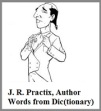Deduce: (v) to derive as a conclusion from something known or assumed
“Don’t pee down my leg and tell me it’s raining.”
That was a very popular line which landed in several movies over the years.
The thought is fairly obvious: if you’re getting pissed on, it’s not rain.
It’s pretty easy to deduce that.
Matter of fact, being able to deduce things is not nearly as complicated as we make it out to be.
If a politician describes a plan which is nearly incomprehensible in its presentation, you can pretty well deduce how impossible it will probably be in application.
If a preacher spends more time discussing the offering he is about to take up than he does preaching the Gospel, it’s pretty easy to deduce that this man or woman is a charlatan.
If someone running for President spends most of their time cutting into the career and character of their opponent, you can probably deduce that they’re pretty much of a rascal themselves.
Deducing is the ability to know that more than likely something is true—and if you overstate it, you didn’t do it by much.
Of course, every human being born since Cain and Abel has complained about being judged, never considering that people are often including the history of their character in the determination.
Deducing leads to deductive reasoning, which very plainly consists of:
“If A equals B and B equals C, then A equals C.”
On those rare occasions when that would not be true, you can feel free to apologize for your slip-up.
But being able to deduce saves an awful lot of time, money and embarrassment in the midst of this journey we call life.










